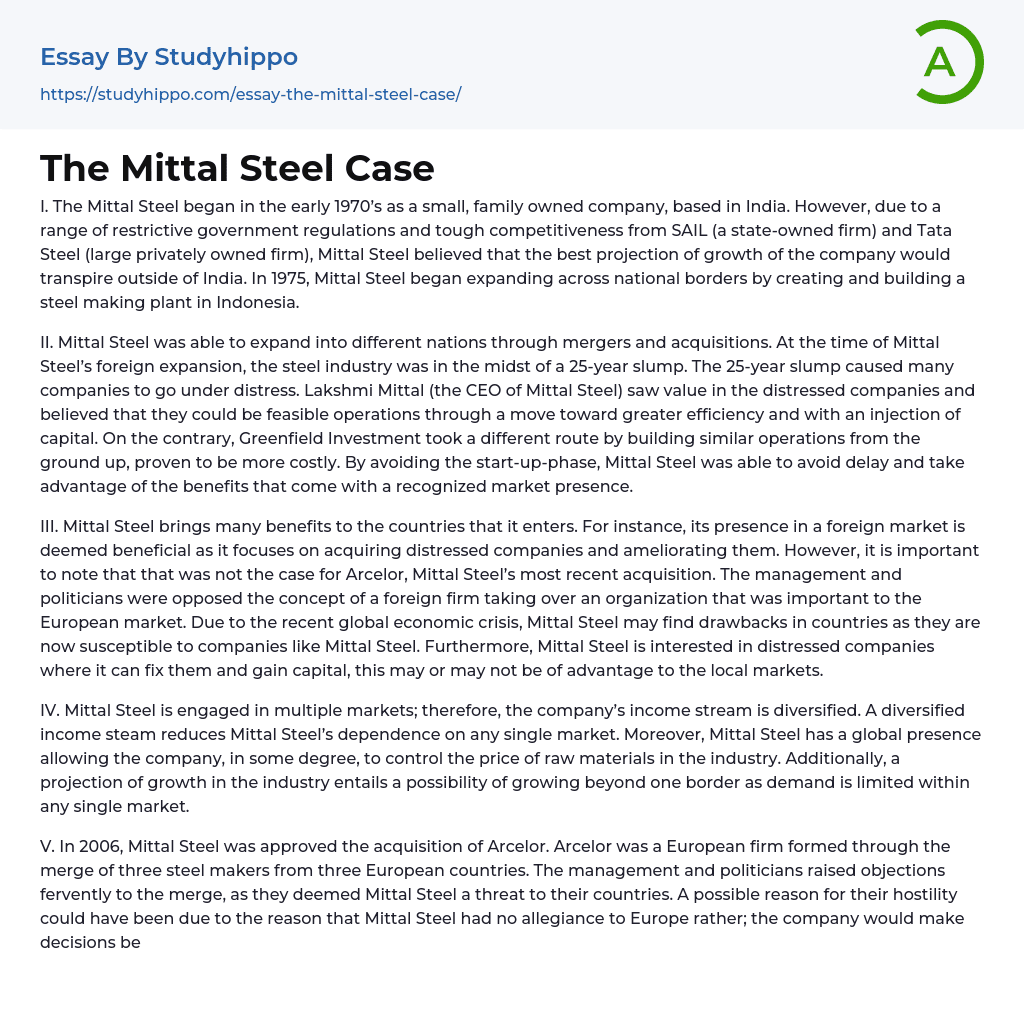I. In the early 1970s, Mittal Steel was established as a modest, family-owned enterprise headquartered in India. Nonetheless, it faced challenging government restrictions and fierce competition from SAIL (a state-owned company) and Tata Steel (a large privately owned company). Consequently, Mittal Steel envisaged its optimal progress would occur beyond Indian borders. By 1975, the company ventured internationally by constructing a steel production facility in Indonesia.
II. Mittal Steel successfully broadened its operations into a variety of nations via mergers and acquisitions. During the period of the company's international expansion, the steel industry was experiencing a quarter-century decline. This long-term downturn pushed numerous companies into distress. Lakshmi Mittal, the Chief Executive Officer of Mittal Steel, recognized potential in these struggling companies and was confident that with improvements in efficiency and capital infusion, they could be tra
...nsformed into viable operations. Meanwhile, Greenfield Investment opted to establish similar operations from scratch, an approach proved to be more expensive. By bypassing this startup phase, Mittal Steel eliminated potential delay and capitalized on the perks associated with a well-established market presence.
III. Mittal Steel is known to provide substantial advantages to the nations it expands into. Its operations in overseas markets are generally seen as beneficial because it primarily targets struggling businesses, working to improve their conditions. Yet, it's important to acknowledge that this was not the situation in the case of Arcelor, Mittal Steel's latest acquisition. Both management and politicians resisted the idea of a foreign entity taking control of a company that held significance in the European market. Currently, due to the global economic downturn, countries may be more vulnerable to companies like Mittal Steel, which could bring potential downsides.
Moreover, Mittal Steel shows interest in salvaging struggling businesses, aiming to increase their value and profit, although the impact on local markets may vary.
IV. Mittal Steel operates across several markets, ensuring a varied revenue stream. This diversification minimizes the company's reliance on any single market. Furthermore, Mittal Steel's global footprint grants the company some extent of influence over raw material prices within the sector. The projected industry growth also indicates potential for expansion beyond domestic borders, as demand is restricted within any individual market.
V. The acquisition of Arcelor by Mittal Steel was sanctioned in 2006. Arcelor, a European entity, was formed by merging three steel manufacturing companies from three different European countries. The management and politicians fervently protested against the merger as they considered Mittal Steel as a potential risk to their respective nations. Their hostility could have origin from the fact that Mittal Steel held no loyalities to Europe but rather, would be focused on the benefits for their own firm and not the local market. Although the apprehensions of the politicians had some validity, the shareholders of Arcelor gave their approval for the takeover. Furthermore, Mittal Steel could not be considered a foreign entity as its main office is in Rotterdam, which makes it a European enterprise.
- Absolutism essays
- Appeal essays
- Bourgeoisie essays
- Contras essays
- Corporate Governance essays
- Corruption essays
- Democracy essays
- Democratic Party essays
- Developed Country essays
- Dictatorship essays
- Elections essays
- European Union essays
- Federalism essays
- Foreign essays
- Foreign policy essays
- Gentrification essays
- Hillary Clinton essays
- Income Tax essays
- International Relations essays
- John Marshall essays
- John Stuart Mill essays
- Left-Wing Politics essays
- Liberty essays
- Military essays
- Monarch essays
- Monarchy essays
- Political Corruption essays
- Political Party essays
- Political Science essays
- President Of The United States essays
- Public Service essays
- Red Cross essays
- Reform essays
- Republic essays
- Revenge essays
- Social Security essays
- Sovereign State essays
- State essays
- Supply essays
- Terrorism essays
- United Nations essays
- World Trade Organization essays
- Steel essays




